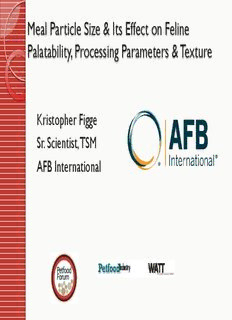
Download - AFB International PDF
Preview Download - AFB International
Meal Particle Size & Its Effect on Feline Palatability, Processing Parameters & Texture Kristopher Figge Sr. Scientist, TSM AFB International Introduction General discussion about felines Factors affecting feline palatability (PAL) Hypotheses Experimental design, measurements Results Conclusions General Items about Felines As obligate carnivores, will choose higher protein diets over lower protein diets. Cats are more likely than dogs to avoid spoilage aromas. Lack lateral jaw movement; hence, texture and size are very important. Lack molars, and cannot grind their food. Acidification may help salivation. Surface texture plays a role in palatability. Different breeds of cats pick up their food differently with their tongue (Royal Canin 2002). In PAL testing, cats tend to consume food from both bowls. First choice is not necessarily linked to total consumption. Feeding time is generally 15 hours. Factors Affecting Feline PAL Raw Materials (Fats, oils, meals, palatants, etc.) Texture / Size / Processing Shape (sME, etc.) Pilot Study PAL Results In an initial study conducted at the Lovejoy Resource Center, we saw a significant PAL improvement with the meal that was double ground. Ration A Ration B IR-A FC-A CR PREF p-value Double Grind Disc Control Grind Disc 0.65 0.68 1.8A 12A : 3B 0.002 However, this study only focused on PAL. During the extrusion we found some very interesting changes in processing parameters with the double ground kibble. Also, anecdotally, we noticed some texture differences Hypotheses—New Study Meal particle size will affect: The processing parameters of a dry feline 1) diet. The texture and physical profile of a dry 2) feline diet. The PAL of a dry feline diet. 3) Experimental Design Standard / fixed reference points: Both diets were extruded as a disc, based on previous research. Same lot of meal used for both diets. Meal: 34% protein / 13% fat; by-product meal & grain-based. Both diets coated with the same components: Fat: 5.0% poultry fat Palatant: 1.5% dry cat palatant Same moisture content Actual: 7.2% (control) and 6.5% (double) 3 Same bulk density (lbs./ft ) Actual: 21.5 (control) and 23.0 (double) Experimental Design (cont’d) Variable(s) in the study: 1) ―Control‖ ground meal 2) ―Double‖ ground meal • WHOLE Hammer Mill (#3) GRAINS • VITAMINS Mixer • MINERALS • OTHER INGREDIENTS Hammer Mill (#3) Pre-Conditioner Batch Hopper Pre-Conditioner Extruder Dry Feline Formula INGREDIENT POUNDS % CHICKEN BY-PRODUCT MEAL 1125 28.13% CORN FLOUR 853 21.33% CORN GLUTEN MEAL 630 15.75% WHEAT FLOUR 405 10.13% BREWER'S RICE 405 10.13% SOYBEAN MEAL 225 5.63% FISH MEAL, MENHADEN 135 3.38% CELLULOSE 135 3.38% CALCIUM, GRANULAR 22.5 0.56% POTASSIUM CHLORIDE 22.5 0.56% SODIUM CHLORIDE 11 0.28% CHOLINE CHLORIDE 11 0.28% TAURINE 6.5 0.16% VITAMIN PRE-MIX 4.5 0.11% MINERAL PRE-MIX 4.5 0.11% D,L-METHIONINE 4.5 0.11% TOTALS 4000 100.00% Equipment
Description: